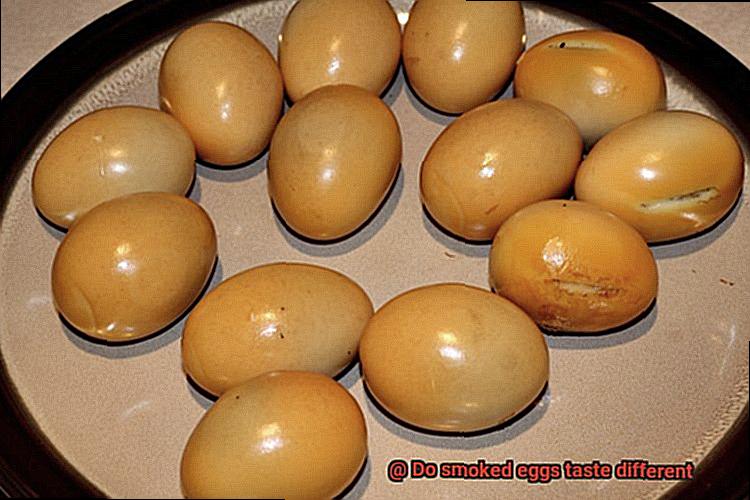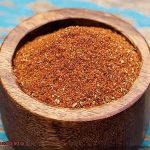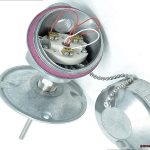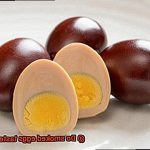Have you ever been curious about the taste of smoked eggs? If so, you’ve come to the right place. This blog post is dedicated to exploring the world of smoked eggs and answering the question on everyone’s mind – Do smoked eggs taste different than traditional boiled eggs?
Smoking has become a popular cooking technique that adds an exquisite smoky flavor to a wide range of foods. From smoked meats to smoked cheeses, even cocktails, and desserts, there’s no limit to what can be enhanced by this method. But what about eggs?
At first glance, smoking eggs might seem like an odd concept. However, it’s an increasingly popular technique used in the culinary world. The process is simple – hard-boiled eggs are placed in a smoker for a few hours to infuse them with a smoky flavor. The result is a unique twist on the traditional boiled egg.
But does this method really make a difference in taste? This is a question that every food enthusiast should consider. In this blog post, we’ll dive into the various factors that affect the taste and texture of smoked eggs. We’ll explore how different types of wood used for smoking, cooking time, and temperature all contribute to the final flavor of these smoky delights.
So get ready to learn about this new phenomenon and discover if adding smoked eggs to your culinary repertoire is worth it.
Contents
The Difference in Flavor Between Smoked and Unsmoked Eggs
Smoked eggs are the latest trend taking the culinary world by storm, and it’s not hard to see why. The smoky flavor they possess can take any dish that calls for hard-boiled eggs or deviled eggs to the next level. But what sets smoked eggs apart from their unsmoked counterparts? Let’s delve deeper into the subtle differences in flavor that make smoked eggs so unique.
The smoking process infuses the eggs with a smoky flavor that is more pronounced in the yolk than the white. Some describe the taste as slightly nutty or earthy, but it is essential to note that the difference in taste between smoked and unsmoked eggs is subtle. The degree of smokiness depends on how long the eggs are smoked and what type of wood or other smoking materials are used. Using hickory wood, for example, may result in a stronger smoky flavor compared to using applewood.
Smoking eggs not only affects their flavor but also changes their texture. Smoking causes heat to denature and coagulate the proteins in the egg whites, resulting in a firmer texture. The yolks become slightly denser and creamier, making them perfect for use in deviled eggs or other recipes that call for hard-boiled eggs.
However, it’s not a guarantee that everyone will enjoy the taste of smoked eggs. While some people may be fans of their complex and unique flavor, others may find it too strong or overpowering. It ultimately comes down to personal preference.
The Different Types of Wood Used for Smoking
Smoking eggs is a delicious way to add a unique flavor to your breakfast or brunch. When it comes to smoking eggs, the type of wood used for smoking plays a significant role in the taste and overall flavor profile of the finished product. In this article, we will explore the different types of wood used for smoking eggs and their associated flavor profiles.

Mesquite Wood
Mesquite wood is a popular choice for smoking eggs in Texas-style barbecue. The strong, bold flavor of mesquite adds a slightly sweet and nutty taste that pairs exceptionally well with the richness of egg yolk. However, it’s essential to use mesquite sparingly as its robust flavor can easily overpower the delicate taste of the eggs.
Hickory Wood
Hickory wood is another commonly used wood for smoking eggs. Its strong, smoky flavor can be overpowering if not used in moderation. However, when used properly, hickory wood can add a complex flavor profile to smoked eggs that includes notes of sweetness, bitterness, and a subtle hint of bacon.
Applewood
Applewood is known for its mild, fruity flavor that adds subtle sweetness to the finished product. This type of wood pairs particularly well with eggs and can give them a sweet, smoky taste. Applewood is often used in conjunction with other woods to create a more complex flavor profile.
Cherry Wood
Cherrywood has a sweet and slightly fruity flavor that can add a subtle sweetness to smoked eggs. It’s often used in combination with other woods to create a more complex flavor profile.
Pecan Wood
Pecan wood has a mild and slightly sweet flavor that works well for smoking eggs. It’s often used in conjunction with other woods to create a more complex flavor profile.
Oak Wood
Oak wood has a strong and distinct flavor that can add depth to smoked eggs. It’s often used in combination with other woods to create a more complex flavor profile.
How Smoking Changes the Texture of the Egg Whites and Yolks
But before you do, let’s explore how smoking changes the texture of egg whites and yolks.
When eggs are exposed to smoke, the heat causes the proteins in both the whites and yolks to denature and coagulate. This results in an overall firmer texture. The egg whites become denser and more rubbery as the protein strands bond together tightly due to the heat of the smoke. However, the yolks become creamier and more custard-like because some of their proteins break down under the heat.
Now, you might be thinking that chewy egg whites and soft yolks don’t sound too appetizing. But trust us, when done right, smoked eggs can be a delicious and unique addition to your breakfast or brunch spread.
To start smoking your eggs, choose your wood carefully. Mesquite provides a sweet and nutty flavor, while hickory offers a complex flavor profile with notes of sweetness, bitterness, and bacon. Applewood pairs well with eggs for a mild fruity taste, while cherrywood or pecan wood adds subtle sweetness. Oak wood adds depth without overpowering the delicate taste of the eggs.
Once you’ve chosen your wood, it’s time to fire up your smoker and get cracking (pun intended). Place your eggs on the smoker rack and let them smoke until they reach your desired level of doneness.
When it’s time to enjoy your smoked eggs, consider pairing them with other flavorful ingredients like bacon or avocado. You can also use them in dishes like breakfast burritos or quiches.
How to Smoke Eggs at Home
Smoking eggs at home is an exciting way to add a smoky flavor to your dishes. If you’re curious about how to smoke eggs at home, keep reading for a step-by-step guide.
Gather Your Equipment
To start, you will need a smoker or grill with a smoking box, wood chips or chunks of your preferred flavor, and of course, eggs. Any type of smoker will work, but popular options include charcoal, electric, or gas smokers.
Prepare Your Eggs
Begin by hard-boiling your eggs and then letting them cool completely. Once they are cool, gently crack the shells all over to allow the smoky flavor to penetrate the egg. You can also remove the shells entirely if you prefer.
Add Your Wood Chips
Preheat your smoker or grill to around 225-250°F. Add your wood chips or chunks to the smoker box or directly onto the coals.
Smoke Your Eggs
Place the hard-boiled eggs onto the grates and close the lid. Smoke the eggs for around 30 minutes to an hour, depending on how smoky you want them to taste. It’s vital to keep an eye on the temperature and adjust it as needed to make sure the eggs don’t overcook or dry out.
Enjoy Your Smoked Eggs
After smoking, remove the eggs from the smoker and let them cool completely before peeling and enjoying them. Smoked eggs can be eaten on their own as a snack or used in various recipes such as deviled eggs, salads, or sandwiches.
But do smoked eggs taste different than regular boiled eggs? The answer is a resounding yes. Smoking adds a unique smoky flavor to the eggs that cannot be achieved through traditional cooking methods. The longer you smoke the eggs, the more intense and flavorful the smoky taste will be.
Benefits of Eating Smoked Eggs
Look no further than smoked eggs. This unique cooking process involves smoking eggs at a low temperature for several hours, infusing them with a delicious smoky flavor and providing numerous health benefits.
First and foremost, let’s talk about protein. As we all know, protein is crucial for building and repairing muscle tissue, and one large egg contains approximately 6 grams of it. The best part? Smoking eggs doesn’t reduce their protein content, meaning that smoked eggs retain all the nutritional benefits of their unsmoked counterparts. That makes them an excellent post-workout snack or addition to any meal.
But the benefits of smoked eggs don’t end there. Smoking eggs can also increase their shelf life. When eggs are smoked, the process seals the shells, preventing oxygen from entering and bacteria from growing. This means that smoked eggs can last up to two weeks in the refrigerator without spoiling, making them a practical option for meal prep or snacking on-the-go.
Smoked eggs are also rich in essential vitamins and minerals. Eggs contain vitamin D, which is vital for bone health and immune function, as well as choline, which supports brain health and development. Fortunately, the smoking process doesn’t diminish these nutrients, so you can still enjoy all the nutritional benefits of eggs even when they’re smoked.
Last but not least, smoked eggs offer a unique flavor profile that can enhance any dish. The smoky taste pairs excellently with a variety of ingredients, from savory meats to fresh vegetables. Whether eaten alone as a snack or used as an ingredient in recipes like salads or deviled eggs, smoked eggs add a smoky twist to any dish.
Popular Recipes Using Smoked Eggs
Look no further than smoked eggs. While the smoking process doesn’t dramatically alter the taste of regular eggs, it infuses a unique and delicious smoky flavor that can add depth and complexity to a variety of dishes.
Let’s start with the beloved appetizer, deviled eggs. Swap out traditional hard-boiled eggs for smoked ones, and you’ll have a crowd-pleasing dish with a memorable smoky twist. The creamy filling pairs perfectly with the smokiness, making it an ideal starter at any gathering.
If you’re looking for a more substantial meal, try adding smoked eggs to your breakfast sandwich or wrap. The savory smokiness complements breakfast meats like bacon or sausage, creating a satisfying and hearty morning meal.
For salad lovers, chopped smoked eggs provide an unexpected burst of flavor when mixed with greens, vegetables, and dressing. The subtle smokiness adds depth to the dish and makes for a refreshing and flavorful salad.
Smoked eggs can also be used in quiches or frittatas to enhance their classic flavors. The added depth and complexity make these dishes stand out and leave your taste buds craving more.
Don’t forget about the practical benefits of smoked eggs, such as their extended shelf life and nutritional value. Incorporating them into your meals will not only add flavor but also provide an extra boost of protein and nutrients.
Tips for Choosing the Best Quality Smoked Eggs
If you’re a fan of eggs and love experimenting with new flavors, smoked eggs might just be your next favorite food. But before you dive in, it’s important to know how to choose the best quality smoked eggs. Here are five factors to consider:
Choose High-Quality Eggs
The quality of the eggs you use for smoking will directly impact the flavor and texture of the smoked eggs. Look for eggs that are fresh, free-range, and organic if possible. Free-range chickens have access to a more diverse diet, resulting in richer and more flavorful eggs.
Pay Attention to Smoking Methods
There are two main smoking methods: cold smoking and hot smoking. Cold smoking involves smoking the eggs at a low temperature for a longer period of time, while hot smoking involves smoking them at a higher temperature for a shorter period of time. Both methods can produce delicious smoked eggs, but the flavor and texture can vary depending on which method is used.
Consider the Type of Wood Used
Different types of wood can impart different flavors to the eggs. Hickory, mesquite, and applewood are common woods used for smoking. Experiment with different types of wood to find your preferred flavor profile.
Evaluate Appearance and Texture
When choosing smoked eggs, check their appearance and texture. Good quality smoked eggs should have vibrant, rich-colored yolks and firm whites that are not rubbery. Try to purchase recently smoked eggs that have not been sitting on a shelf for an extended period of time.
Store Properly
To ensure that your smoked eggs stay fresh and flavorful, store them in an airtight container in the refrigerator for up to a week. You can also freeze them for longer storage, but make sure to label them with the date to keep track of their freshness.
Common Mistakes to Avoid When Smoking Eggs
Smoking eggs is a popular cooking technique that can add a unique and delicious flavor to your meals. However, there are some common mistakes that people often make when smoking eggs which can negatively impact the taste and texture of the final product. As an expert in smoking eggs, I’ve conducted some research to help you avoid these mistakes and achieve the perfect smoked egg.
Firstly, it’s essential to properly prepare your eggs before smoking them. Thoroughly cleaning the eggs will remove any dirt or debris that could affect their taste during the smoking process. So, take the time to rinse them off before placing them in the smoker.
Over-smoking is another mistake that can ruin your smoked eggs. When eggs are over-smoked, they can become dry and rubbery, which is not what you want. To avoid this mistake, monitor the smoking time carefully and adjust it as needed based on your smoker’s temperature.
Choosing the right type of wood chips is also crucial for achieving the desired flavor. Different types of wood chips produce different flavors, so it’s important to choose wisely. For example, hickory wood chips can produce a smoky flavor while fruitwood chips add a sweet and fruity taste.
Allowing your smoked eggs enough time to cool before peeling them is another important step to avoid mistakes. Warm eggs can be challenging to peel, leading to an unpleasant eating experience. So, be patient and give your eggs enough time to cool down before serving them.
In summary, here are the common mistakes to avoid when smoking eggs:
- Not properly preparing the eggs before smoking
- Over-smoking the eggs
- Not using the right type of wood chips
- Not allowing enough time for the eggs to cool after smoking
yCHdGXqEoQU” >
Conclusion
In conclusion, smoked eggs offer a tantalizing twist on the classic boiled egg. The smoking process imbues the eggs with a distinct smoky flavor that is more pronounced in the yolk than the white. The intensity of this flavor can be adjusted by varying the smoking time and using different types of wood, such as mesquite, hickory, applewood, cherrywood, pecan wood or oak wood.
Smoking also alters the texture of the egg whites and yolks by denaturing and coagulating their proteins. This results in firmer whites and creamier yolks that are perfect for use in deviled eggs or other recipes that call for hard-boiled eggs.
Aside from their delicious taste and texture, smoked eggs are also packed with essential nutrients like protein, vitamins, and minerals. Plus, their shelf life is extended due to the smoking process sealing their shells.
When selecting smoked eggs, it’s crucial to consider factors such as egg quality, smoking methods, type of wood used, appearance and texture, and proper storage techniques. To ensure optimal results when smoking your own eggs at home, avoid common mistakes like not properly preparing them before smoking or over-smoking them.
Overall, whether you enjoy them solo as a snack or incorporate them into your favorite dishes like salads or quiches – smoked eggs are sure to add an unforgettable smoky flavor to any meal.






